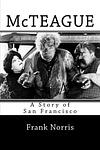Frank Norris
Frank Norris was an American novelist during the Progressive Era, predominantly known for his naturalistic novels. Born on March 5, 1870, in Chicago, Illinois, and dying on October 25, 1902, Norris wrote works that depicted the struggles of individuals in the face of societal and economic pressures. His most famous works include 'McTeague' (1899), 'The Octopus: A Story of California' (1901), and 'The Pit' (1903), which are considered part of his 'Epic of the Wheat' trilogy. Norris's writing style was influenced by French naturalism and the works of Émile Zola, and his novels often explored themes such as human nature, social justice, and the power of the environment over individuals.
Books
This list of books are ONLY the books that have been ranked on the lists that are aggregated on this site. This is not a comprehensive list of all books by this author.
-
1. Mc Teague
This novel is a gripping tale of a slow-witted dentist and his descent into brutality and violence in San Francisco at the turn of the 20th century. The protagonist, initially a kind and somewhat naive man, finds his life irrevocably changed after winning a lottery. The newfound wealth leads to greed, jealousy, and ultimately, tragedy, not just for him but also for those around him, including his wife. The story is a stark exploration of the darker aspects of human nature and the destructive power of materialism, showcasing the author's naturalist style by highlighting how environment and heredity inexorably shape human destiny.
The 1121st Greatest Book of All Time -
2. The Octopus
The book in question is a turn-of-the-century American novel that explores the conflict between wheat farmers in California and the railroad monopoly, which seeks to control the means of transportation and manipulate market prices for its own gain. The narrative delves into the lives of a diverse cast of characters, including farmers, railroad barons, and other individuals caught in the struggle, painting a vivid picture of the harsh realities of agrarian life and the ruthless nature of corporate power. The story is a poignant critique of unchecked capitalism and the devastating impact it can have on individuals and communities, ultimately serving as a reflection on the broader social and economic tensions of the era.
The 5265th Greatest Book of All Time

